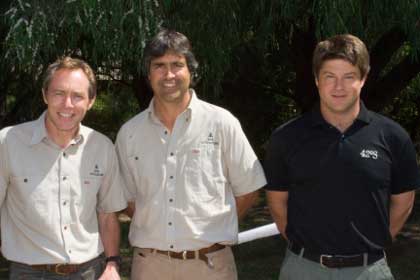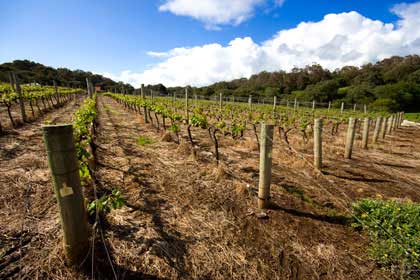Viticultural and Expert Consulting

Our consulting service has assisted many clients since company inception in 1994. We will formulate a consulting service that meets your requirements. This might range from technical and viticultural consulting support through to full management services. Consulting can include regular scheduled visits or visits at key phenological stages to visits as required. We have experienced consulting and technical staff to match your requirements. The consulting service can also extend to providing specialist reports and arbitration, independent expert reports and advice.
Previous clients have included grape growers and wineries, government departments, lawyers, accountants and agricultural service companies across Australia. We have provided viticultural consulting to many clients from 1994 to 2017.
Some areas of expert reporting include:
- Ad hoc problem solving.
- One off reports in all aspects of viticulture.
- Independent expert reports.
- Land capability assessments.
- Soil assessment reports.
- Land use planning.
- Sub division reports.
- Water requirement assessment.
- Dispute resolution.
- Financial reporting.
- Business plans.
- Insurance reports.
- "Vine to wine" service (see below for more information).
Viticultural Consulting
Our consultants understand the need to assess and advise on the basis that every vineyard has its own unique challenges and distinct objectives. As such, client requirements range from one-off assessments and recommendations, to fully scheduled consultation packages. Site visits can be scheduled at regular intervals or to correspond with key phenological stages. Vineyards are divided into management units (according to grape variety, vine age, trellis system, etc) to facilitate the application of specific programs. Consultation involves a thorough inspection of each management unit and is followed up by a report in which observations and recommendations are made. The consultant is able to provide guidance on any number of the following:
- Irrigation requirements to meet fruit quality specifications.
- Annual nutrition program based on petiole analysis.
- Annual weed control program.
- Annual pest and disease control program; modified to maximise control and minimise costs based on monitoring results as the season progresses.
- Soil management recommendations based on soil testing.
- Timeliness of vineyard operations to optimise efficiency of management.
- Cover cropping strategies.
- Sustainable viticulture: low input programs.
- Canopy management and pruning recommendations.
- Vine balance assessments.
- Application of precision viticulture technologies.

"Vine to Wine"
Improved knowledge and technologies are providing grape growers and winemakers with opportunities to understand more clearly the important vine and fruit characteristics that contribute to or are associated with certain wine styles and quality. In addition, this knowledge and technology provides us with better ways of ensuring that fruit arrives at the winery at the required specifications. While wineries and grape growers will always be free to structure their supply arrangements as they see fit, a clear and concise set of the common assessment criteria will help to reduce uncertainty by all parties. For grape growers, the benefit will be in increased transparency and understanding of the winery's expectations. For the winery, the benefit will be in an increased ability by the grower to interpret winemaker's requirements and provide fruit to the desired specification. The objective of the 'Vine to Wine' service is to complete an independent vineyard assessment at key phenological stages. Assessment sheets for each management unit are completed and provide a 'snapshot' of soil condition, quality of pruning, crop load, condition of the canopy, and fruit maturity, purity and condition. At harvest, the assessment sheet is seen as an important management tool for both the winery and grape grower to ensure that fruit meets specification at the weighbridge. Photographs of the canopy are taken at the harvest assessment. The benefits of using assessment sheets are that they:
- Provide consistency in vineyard evaluation.
- Provide consistency in fruit evaluation.
- Facilitate the batching of parcels of fruit.
- Help explain differences between blocks and vineyard sites.
- Help solve vineyard quality problems.
- Provide a way of monitoring changes in vineyard performance.
- Provide a method of feedback to both the grower and winery.
The results of each assessment can be used by the vineyard managers to modify management to achieve the desired fruit specification in the current season. They can also be used to benchmark year by year performance to assist managers in reapplying management inputs to achieve consistent high quality. The assessment sheets can be used to assist in scoring fruit for winemaking. In circumstances where fruit condition is in dispute the results of the assessment results can be used is to arbitrate.
Land Use Capability
As part of our commitment to the development and management of quality vineyards, we offer a service for assessing the land capability of either potential viticultural sites or existing vineyards. Utilising the latest technologies available the service provides a detailed report on the soil types and other boundaries across the property and recommendations on vineyard design and management.
Assessment A soil survey is carried out to determine the soil types present, their boundaries and their physical and chemical properties. The survey is carried out in the following sequence:
- A reconnaissance survey is carried out using one or more of the soil sensing devices and GPS to determine preliminary soil boundaries and topography.
- Soil pits are excavated at representative locations for each soil type and the soil profiles described and analysed for key physical and chemical properties.
- Soil types are classified as to their suitability for viticulture and a range of soil type, topographical and vineyard design maps are generated.
Technology Soil sensing involves the 'on-the-go' collection of information related to soil properties, often employing one or more soil sensors. Accurate positional and elevational data can be collected at the same time. The most commonly used vineyard soil sensors at present include electromagnetic induction sensors, gamma-ray spectometers and ground penetrating radar. With the development of this equipment the collection of data can be performed at a greater spatial resolution than using manual methods. Experience has shown that by using this technology we are able to reduce the number of soil pits required to accurately map the soil type boundaries.
Reporting The report includes the following information:
- Areas will be classified as either being highly suitable, suitable, marginal, or unsuitable for wine grape production according to the WA Department of Agriculture's Land Capability class system
- Descriptions of soil pit profiles including: GPS location, potential capability class, rooting depth, depth to water table and horizon descriptions of colour, texture, % gravel and depth.
- Assessment of the site's climate, soil types, topography and regional pest and disease pressures.
- Recommendations on suitable varieties, block layout, row orientation, water resources, and management implications.
- A range of soil maps showing soil type boundaries.
- Topographical maps
- Proposed vineyard layout maps.
- Digital photos of soil profiles.
The digital format of this soil information is invaluable for the future management of the vineyard. All data is provided in digital format which can be viewed using software supplied with the report. Information using other precision viticultural technologies such as airborne remote sensing and yield monitors on harvesters can be added/superimposed for a greater understanding of the site and vine performance. If you would like more information on any of these services, please contact our office and we will direct you to the appropriate person:
Phone: (08) 9756 8011 Fax: (08) 9756 8033
For more information about Precision Viticulture technologies, please refer to the following website www.pvaustralia.com.au
Education & Training
AHA Workshops
Every year we conduct workshops for the local industry based on ongoing and current issues. These are adverstised in the Margaret River Wine Industry Assocation (MRWIA) newsletters and local press. Past workshops have included a Pruning Workshop, Bud Dissection Workshop and an Environmental Management Systems Seminar.
University Lecturing
We are invited by educational institutions to deliver certain viticultural units. TAFE, Curtin University, and University of Western Australia. These are fantastic opportunities for our staff to provide students with a well-integrated commercial and academic perspective.
If you would like more information on this service, please contact our office and we will direct you to the appropriate person:
Phone: (08) 9756 8011 Fax: (08) 9756 8033
Greenhouse Gas Accounting
Would you like to know your vineyard's emissions? We use an internationally acknowledged protocol for greenhouse gas accounting, which is purposely designed for the wine industry. The process includes an evaluation of your operation, summary and breakdown of emissions, a reduction plan and assistance to register your vineyard as greenhouse friendly.
The calculator we use breaks emissions into three scopes. The first scope involves emissions where your enterprise has direct control via ownership e.g. tractor usage. The second scope concentrates on power used by your enterprise e.g. electricity. The third scope is separated when calculations are computed, as it takes into account all emissions from activities that are purchased from other enterprises e.g. contract machinery operations. The separation into scopes ensures emissions are never accounted for twice, two different companies counting same emissions.
By careful classification and accounting of activities, an achievable plan can be developed and implemented for your vineyard. Emissions calculation in the vineyard is made simpler by working off recognised co-efficients and models designed for the wine industry. This makes it possible for your vineyard to measure its emissions, without time consuming data collection.
If you would like more information on this service, please contact us.
Phone: (08) 9756 8011 Fax: (08) 9756 8033